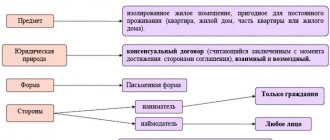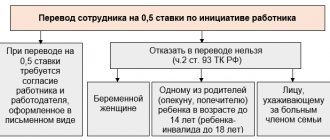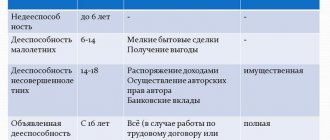Federal Law No. 139-FZ dated July 1, 2017 expanded the opportunities for employers to hire minors. Before this, it was possible to conclude an employment contract with a teenager only during free time from study, and the rules for the employment of those who completed their studies or were expelled were not established by law at all.
Now, in fact, even children under 14 years old can be hired, but subject to a number of conditions and restrictions. The age at which it is permissible to conclude an employment contract is introduced by Art. 63 Labor Code of the Russian Federation.
| Age of the minor | Conditions for concluding an employment contract |
| Up to 14 years old |
|
| 14 years old, completed general education or studies ongoing |
|
| 15 years |
|
As can be seen from the table above, the key characteristics of the work for which minors are accepted by law: the work should not be detrimental to health and moral development, it should be easy. The list of works to which minors cannot be allowed is given in detail in Decree of the Government of the Russian Federation dated February 25, 2000 No. 163. In total there are more than 2000 such works, all of them are in one way or another connected with harmful and dangerous conditions.
Part 5 art. 282 of the Labor Code of the Russian Federation establishes restrictions on part-time work for people under 18 years of age.
Working hours for workers under 18 years of age
If you decide to hire minors, it is important to consider not only the length of the working week for them, but also the length of the working day.
- Length of working week
Unlike most regular employees, for whom the working week is 40 hours, minors are subject to the reduced working hours rule. Moreover, the time is reduced depending on age and other circumstances - in particular, the fact of training is taken into account.
So, for example, for workers under 16 years of age, the working week is no more than 24 hours, and for workers from 16 to 18 years old it is extended by 11 hours, that is, it does not exceed 35 hours (Article 92 of the Labor Code of the Russian Federation).
If, subject to the training of minors and work in their free time during the academic year, the duration of work cannot exceed half of the established norms, namely:
- 12 hours a week if the young man or girl is under 16 years of age;
- 17.5 hours if the minor is between 16 and 18 years old.
In this case, the employer has the right to request a certificate from the educational institution, which confirms the fact of receipt of education.
During the holidays, minor workers who continue their studies can work the entire shortened working week - 24 or 35 hours, respectively.
- Working hours
There are also strict restrictions on the length of the working day established by Art. 94 Labor Code of the Russian Federation:
- teenagers aged 14-15 years work 4 hours;
- teenagers aged 15-16 years - 5 hours;
- young people and girls aged 16-18 years - 7 hours.
If a minor combines studies in general education programs or secondary vocational education programs with work in his free time during the academic year, then the duration of the work shift should not exceed:
- 2.5 hours - if minors are 14-16 years old;
- 4 hours - if minors are 16-18 years old.
Please note that Art. 268 of the Labor Code of the Russian Federation prohibits employers from:
- Send minors on business trips;
- Involve teenagers under 18 years of age in overtime work;
- Give them work at night, on weekends and non-working holidays.
The employer does not have the right to establish a probationary period for a minor employee (Part 4 of Article 70 of the Labor Code of the Russian Federation). He is also prohibited from entrusting this category of employee with performing work under conditions of full individual or collective (team) financial responsibility (Article 244 of the Labor Code of the Russian Federation).
The only exceptions in these cases are the creative spheres: media, cinema, filming, theater and concert activities, circus.
Leave for minors
We all remember well that usually the right to use vacation for the first year of work arises after 6 months of continuous work in the company. But there are categories of workers to whom the legislation (Article 122 of the Labor Code of the Russian Federation) grants the right to annual paid leave before the expiration of six months. These include women - before or immediately after maternity leave, employees who have adopted a child under 3 months of age, and minors. Leave is granted at the request of the employee.
The duration of annual paid leave for an employee under 18 years of age, according to Art. 267 of the Labor Code of the Russian Federation, more than for ordinary employees - this is 31 calendar days.
The employer does not have the right to recall a minor employee from vacation (Part 3 of Article 125 of the Labor Code of the Russian Federation) and compensate for the vacation with money (Part 3 of Article 126 of the Labor Code of the Russian Federation).
How to determine the duration of leave if it is granted to an employee after he reaches 18 years of age? Correct option: based on the totality of time worked separately before and separately after reaching adulthood.
Qualification of exploitation of child labor in articles of the Criminal Code of the Russian Federation
The Criminal Code does not contain a separate article devoted to the exploitation of child labor. This aspect is only an aggravating circumstance when committing other crimes that provide for the imposition of criminal penalties.
Violent acts against minors are punishable by imprisonment for up to 8 years. Read more here https://lexconsult.online/7684-otvetstvennost-po-uk-rf-za-izbienie-nesovershennoletnih-detei
Let's summarize the articles of the Criminal Code of the Russian Federation containing references to the exploitation of child labor into a single table.
| Article of the Criminal Code | The essence of the article |
| 127, part 2, part 3 | unlawful deprivation of liberty of a minor not related to abduction |
| 127.1, part 2, paragraph b, part 3 | purchase and sale of a minor for the purpose of exploitation |
| 127.2, part 2, paragraph b, part 3 | use of minor slave labor |
| 159, part 5 - 7 | fraud due to non-fulfillment of contractual obligations |
How are minors paid?
According to Art. 270 of the Labor Code of the Russian Federation, for workers under the age of 18, production standards are established based on general production standards in proportion to the reduced working hours established for these workers.
If a minor was hired after receiving general or secondary vocational education, and also if he underwent appropriate on-the-job training, then the employment contract may establish reduced production standards.
With time-based wages, wages are paid taking into account the reduced duration of work. In Art. 271 of the Labor Code of the Russian Federation specifies that “the employer may, at his own expense, make additional payments up to the level of wages for employees of the relevant categories for the full duration of daily work.”
If a minor performs piecework work, then payment is made at the established piecework rates. If an employee under 18 years of age studies and works during his free time, then payment is made in proportion to the time worked or depending on output. In both the first and second cases, the employer can also (but should not!) establish additional payments to such an employee’s wages at his own expense.
Age restrictions
According to the Labor Code of the Russian Federation (Article 63), it is allowed to employ citizens whose age has reached 16 years. Subject to certain conditions, employment of citizens under the specified age is possible.
Official employment of minor citizens aged 14 to 18 years is permitted when the child is not in full-time education, has completed general education, or if studies have been terminated taking into account legal norms.
Attention! From the age of 14, children during periods not occupied by schoolwork are allowed only harmless and uncomplicated work that does not interfere with educational activities.
Citizens under 14 years of age can work in some structures (concert, circus, theater). But such activities should not harm the physical or moral health of the child (Article 63 of the Labor Code of the Russian Federation).
To employ citizens under 16 years of age, permission from any of the guardians or parents and trustee structures, expressed in writing, is required.
What to do if the second parent does not agree to the conclusion of an employment contract for a person under 15 years of age ?
What documents are needed to formalize an employment contract with a minor?
The set of necessary documents for drawing up an employment contract greatly depends on the age of the minor worker and certain circumstances - for example, whether he is getting a job for the first time or not. In addition, if the employee is under 14 years old, then the employment contract is signed for him by a parent or guardian.
In its most complete form, this kit will look like this:
- passport (if the teenager has already received one);
- birth certificate (if the minor is under 14 years old);
- consent of one of the parents (guardian) to conclude an employment contract - provided that the minor has not reached the age of 14 years;
- consent of the guardianship and trusteeship authority - for a child under 14 years of age.
- work book (if any). If an employee is hired for the first time, the employer issues a work book.
- SNILS (if available);
- military registration document (if a minor is subject to conscription for military service);
- document on education, a document confirming qualifications (if the work he will perform implies the presence of certain competencies): a certificate of basic general or secondary general education, a diploma of secondary vocational education or even a certificate of training;
- medical certificate of health - issued after a mandatory medical examination, which is required by Art. 266 Labor Code of the Russian Federation. Keep in mind that as part of the health protection of minors, the employer is required to send and pay for them to undergo mandatory pre-employment medical examinations, as well as periodic annual medical examinations until they reach the age of 18 years.
The contract with a minor must specify all the features of the labor relationship: the length of the working week, the duration of annual paid leave and other details. You can use this employment contract with a minor employee as a template - downloadable sample.
Features of drawing up an employment contract
IMPORTANT! A sample of filling out an employment contract with a minor employee from ConsultantPlus is available here
Relationships of a legal nature between an organization and an employee, including a minor, arise taking into account the provisions of the employment contract (Article 16 of the Labor Code of the Russian Federation).
A special form for registering labor relations with children under 18 years of age is not officially provided. The standards for the employment of minor citizens of the country, which must be reflected in the contract, are prescribed in the Labor Code and other regulatory documents of the Russian Federation.
The agreement must contain sections defining:
- title of the document (including number, date and place of execution);
- information about the participants (parties to the agreement);
- general provisions describing the admission of a citizen to the organization for the specified position;
- the subject of the agreement concerning the general provisions for the inclusion of a citizen in the state and the start date of work;
- duties of the parties;
- rights of participants;
- length of time for work and rest;
- the procedure for calculating and paying earnings;
- liability of participants for non-compliance with the provisions of the agreement;
- reasons for termination of the contract;
- procedure for action in the event of controversial situations;
- names and signatures of participants.
A contract with a minor must reflect the length of time for performing work duties (reduced), a ban on certain activities, the right to annual leave (in an increased amount) and the obligation of regular medical examination.
As an annex to the contract, the employee’s personal job description, individual activity schedule, permission from parents and supervisory authorities (if necessary) can be used.
The form of permission from parents is not regulated; it is important that it be in writing and contain significant points:
- Full name of one of the parents and the employed child;
- passport details of the parent and teenager;
- name of the organization where the minor is employed;
- the position for which he is being appointed;
- date of;
- personal signature of the parent.
Upon first employment, the personnel structure of the enterprise issues a work book and a pension system participant document for the employee.
After drawing up an employment contract with a minor employee, an order is prepared for his admission to the organization, indicating his position. Next, instructions are given on safety issues during work, as well as familiarization with the internal regulations of the enterprise.
This is prohibited when working with teenagers.
An employer who hires minors must be well aware of the specifics of the legislation that contain prohibitive provisions, since violation of them is fraught with serious sanctions.
- The law does not allow a probationary period for minor workers. If the standard text of the contract contains this clause, it is necessary to draw up an additional agreement excluding it.
- Persons under 18 years of age cannot be assigned to night shifts, sent on business trips, detained for overtime work, or called on weekends.
- Article 265 of the Labor Code of the Russian Federation lists activities that a minor will not be able to engage in on an official basis:
- work in harmful and/or dangerous conditions;
- underground works;
- work related to the movement of heavy loads;
- professions associated with risks to morality and health (casinos, erotic clubs, bars, transportation and sale of alcohol and/or tobacco products, etc.).
Attention! After the employee reaches the age of majority, the employment agreement with him is renewed. The new (standard) contract excludes benefits that are legally provided only for teenagers.
Dismissal of a minor
It is worth noting that the grounds for dismissing teenagers are the same as for ordinary workers. This, in particular, is repeated failure to fulfill labor duties without good reason, if there is a disciplinary sanction; a one-time gross violation of work duties by an employee (absenteeism, theft, etc.), etc. (for a complete list, see Article 81 of the Labor Code of the Russian Federation). Although there is still one difference: minors cannot be fired due to failure to complete the probationary period, since a probationary period cannot be established for them.
In general, the dismissal procedure has its own characteristics only if the dismissal of a minor occurs at the initiative of the employer: in this case, Art. 269 of the Labor Code of the Russian Federation obliges the employer to comply with a number of additional requirements (the only exception is dismissal due to the liquidation of the organization or termination of the activities of the individual entrepreneur)
- availability of consent from the state labor inspectorate;
- the presence of the consent of the commission on affairs of minors and protection of their rights.
Accordingly, before issuing an order to terminate an employment contract, the employer will have to make written requests to the commission for minors and the state labor inspectorate at the employee’s place of residence, as well as to the elected body of the enterprise.
Only if there is consent, an order is issued, with which the employee must be familiarized, all due amounts are calculated and paid, and a work book is issued.
Orphans and children left without parental care who are dismissed by an organization due to liquidation, reduction of staff or staff, are provided with the necessary vocational training at the expense of the employer, followed by employment, as stated in paragraph 6 of Art. 9 of the Federal Law of December 21, 1996 No. 159-FZ.










